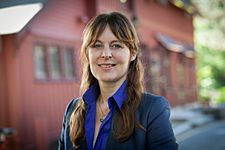Lisa Kaltenegger facts for kids
Quick facts for kids
Lisa Kaltenegger
|
|
|---|---|

Lisa Kaltenegger standing in front of Cornell's Big Red Barn
|
|
| Born | 4 March 1977 (age 48) |
| Known for | Exoplanet atmospheres |
| Scientific career | |
| Fields | Astrophysics Exoplanets |
| Institutions | Cornell University Carl Sagan Institute |
Lisa Kaltenegger was born on March 4, 1977, in Kuchl, Austria. She is an Austrian astronomer who studies exoplanets. These are planets that orbit stars other than our Sun. Her main goal is to find out if these distant planets could have life.
Since July 1, 2014, she has been a professor of Astronomy at Cornell University in the United States. Before that, she worked at the Max Planck Institute for Astronomy in Germany. She also worked at the Harvard-Smithsonian Center for Astrophysics in the US.
Contents
Studying Distant Worlds
Lisa Kaltenegger is famous for her work on the atmospheres of exoplanets. She especially looks at planets that might be similar to Earth. She also studies how our own Earth has changed over time when viewed from space.
Earth's Changing Look
She created an "Alien ID Chart" to show how Earth's appearance would change to a distant telescope. This chart helps scientists understand how different planets might look as they evolve. It shows that as life and geology change a planet, its "fingerprint" in space also changes.
Searching for Life Signs
Dr. Kaltenegger investigates how future telescopes can find signs of life. These signs are called biosignatures. She looked at how the James Webb Space Telescope (JWST) could detect these signs. Her research showed that finding life on many planets will need even bigger telescopes.
Moons and Volcanoes
In 2009, she discussed how to figure out if moons around giant planets could support life. This idea was also explored in the movie Avatar.
In 2010, she studied if we could see volcanoes erupting on exoplanets. Volcanic activity is important for a planet to be habitable. She found that very large eruptions could be detected on nearby exoplanets. This could tell us if other planets are like Earth.
Discovering Habitable Planets
In 2011, she led a team to study Gliese 581 d. This was one of the first small planets found in its star's habitable zone. The habitable zone is the area around a star where a planet could have liquid water.
In 2013, Dr. Kaltenegger was part of a team that found two potentially habitable planets. These were Kepler-62e and Kepler-62f. They are smaller than two Earths and are in their stars' habitable zones. She studied what these planets might look like if they were water worlds.
Earth from Afar
In 2021, Dr. Kaltenegger and J. K. Faherty found many stars that could see Earth. These stars are within 326 light-years of us. From these stars, an observer could see Earth pass in front of the Sun. This means they could detect Earth as an exoplanet. They found over 1,700 such stars that have had this view for thousands of years. Another 319 stars are expected to get this view in the next 5,000 years.
Dr. Kaltenegger is the founder and director of the Carl Sagan Institute at Cornell University. This institute focuses on the search for life in the universe.
Awards and Recognition
Lisa Kaltenegger has received many honors for her work.
- An asteroid, 7734 Kaltenegger, is named after her.
- In 2007, Smithsonian Magazine named her America's Young Innovator in Arts and Science.
- She received the Paul Hertelendy Prize for Outstanding Young Scientist.
- In 2012, she was named an EC Role Model for the Women in Research & Science Campaign of the EU.
- She was awarded the Heinz Maier-Leibnitz-Preis in physics in Germany. This award is given to only six young researchers each year.
- In 2014, she received the Christian-Doppler Prize for Science and Innovations.
See also
 In Spanish: Lisa Kaltenegger para niños
In Spanish: Lisa Kaltenegger para niños
 | Isaac Myers |
 | D. Hamilton Jackson |
 | A. Philip Randolph |

